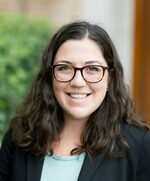Julia Spear, Graduate Student of Katharine White, Featured for Paper in the Journal of Cell Science

Julia Spear, a fifth year graduate student in the laboratory of Katharine White, Clare Booth Luce Assistant Professor, has been profiled by the Journal of Cell Science for her recent publication. The paper, entitled “Single-cell intracellular pH dynamics regulate the cell cycle by timing G1 exit and the G2 transition,” appears in Volume 136, Issue 10 of the journal.
Her research focuses on the study of how intracellular pH (pHi) changes during cell cycle progression. Normal human epithelial cells function in a pHi range of 7.0-7.2, but transient pHi changes are necessary for cell behaviors such as cell movement, cell division, and programmed cell death. While it is known that pHi changes during these processes, very little is known of the detailed nature of how pHi varies with time or across heterogeneous cell populations. Spear was able to investigate these details using microscopy to measure pHi in single cells using a fluorescent biosensor. She captured images as cells progressed through the cell cycle and found that single cell pHi oscillates during growth and division, with dynamic pHi values corresponding to specific events in the cycle. Additionally, she found that manipulating pHi can alter the lengths and transitions of cell cycle stages. Ultimately, being able to accurately describe pHi over time improves the understanding of how cells time and regulate cell division. This work also suggests routes for therapeutically manipulating or perturbing the cell cycle in normal pH-dependent cell processes like wound healing or in diseases with dysregulated pHi such as cancer and neurodegeneration.
Spear first began research during the summer before her senior year at Susquehanna University prior to coming to Notre Dame. She credits White’s guidance and mentorship in helping to achieve these important research results. After graduation, Spear plans to pursue either a postdoctoral fellowship or an industrial job with a biology focus.
Originally published by at chemistry.nd.edu on May 31, 2023.
Latest Research
- University of Notre Dame and IBM Research build tools for AI governanceMain Building (Photo by Matt Cashore/University of Notre Dame) …
- Smarter tools for policymakers: Notre Dame researchers target urban carbon emissions, building by buildingCarbon emissions continue to increase at record levels, fueling climate instability and worsening air quality conditions for billions in cities worldwide. Yet despite global commitments to carbon neutrality, urban policymakers still struggle to implement effective mitigation strategies at the city scale. Now, researchers at Notre Dame’s School of Architecture, the College of Engineering and the Lucy Family Institute for Data & Society are working to reduce carbon emissions through advanced simulations and a novel artificial intelligence-driven tool, EcoSphere.
- Seven engineering faculty named collegiate professorsSeven faculty members in the Notre Dame College of Engineering have been named collegiate professors—a prestigious title awarded by the university and college in recognition of excellence in research, teaching and service. The designation may be conferred on faculty at the assistant, associate or…
- ‘A special challenge’: German studies scholar wins National Humanities Center fellowship for research on medieval womenFor CJ Jones, the joy of research is not the answers but the journey. And the next step on that journey is a fellowship with the National Humanities Center. …
- Notre Dame Lead Innovation Team partners with local WIC program to identify, prevent lead poisoning in childrenB.A.B.E. store “shoppers” now have something new to help their families: free lead screening kits offered by the University of Notre Dame’s Lead Innovation Team.
- Notre Dame Welcomes Ninth Cohort of Warrior-Scholars for Transformative Academic JourneyNOTRE DAME, IN – The University of Notre Dame recently concluded its ninth successful Warrior-Scholar Project (WSP) boot camp, hosting 34 dedicated Warrior-Scholars from June 21st to 28th. This intensive, week-long academic residency provided transitioning service members and veterans…













